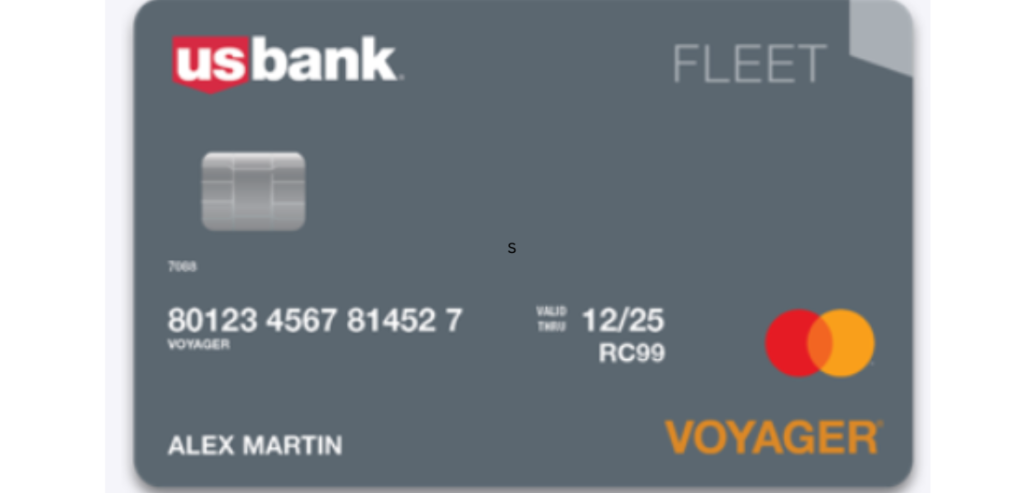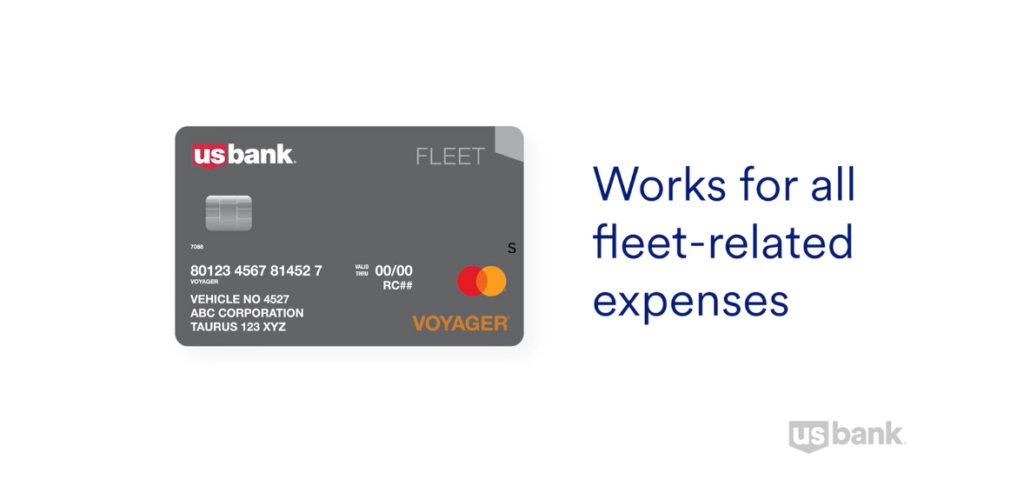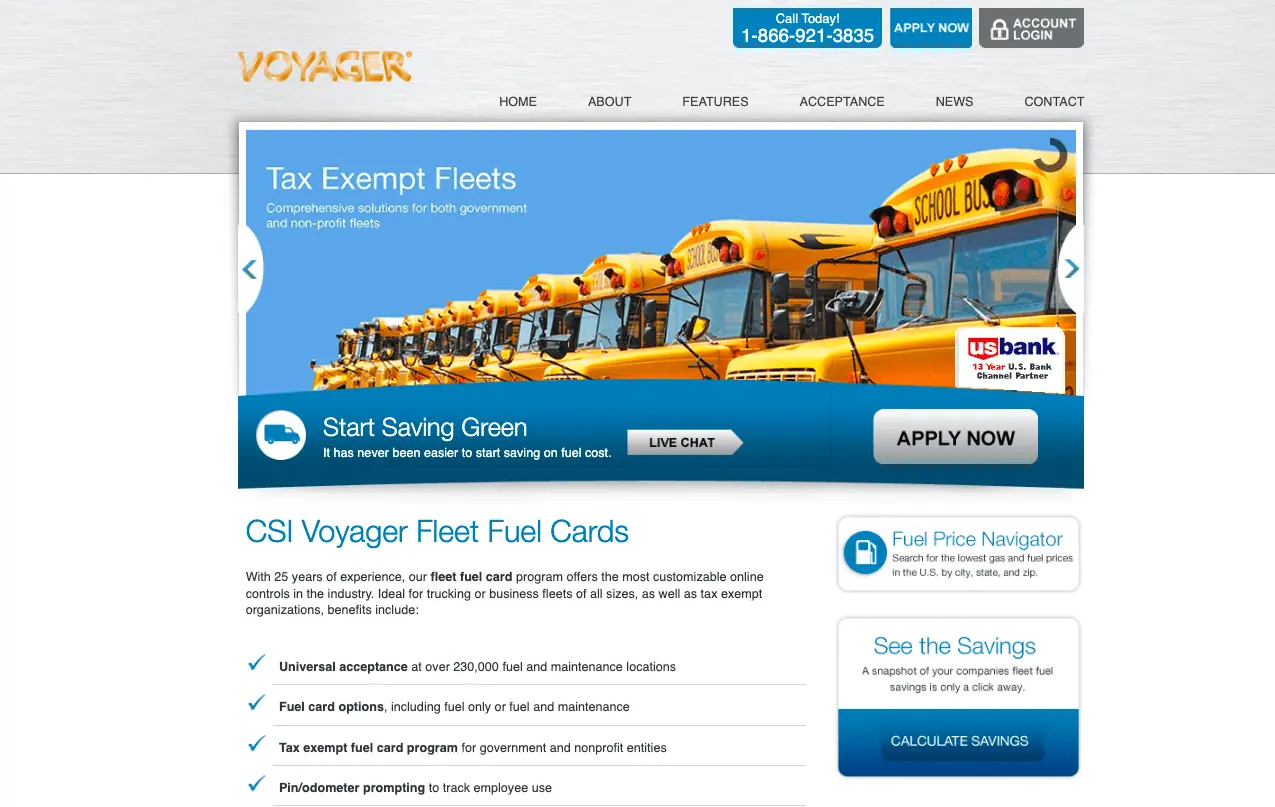The market for fleet cards grows daily, and with so many choices available, it can be hard to determine what’s best for your business. While there isn’t a one-size-fits-all solution for fleet cards, the Voyager Fuel and Fleet card is an excellent place to start. This universal fleet card offers you a lot of flexibility, but that comes with some caveats.
This article’ll review the Voyager Fuel or Fleet card, including its different types, benefits, and drawbacks, and whether it suits your needs.
Voyager Fleet Card

Image Source
Voyager Fuel cards are a U.S. Bank product distributed through third-party partners, so you benefit from being affiliated with a smaller company. Fuel purchases can be made at hundreds of thousands of gas and maintenance stations nationwide with this card, making it one of the universal fuel cards available.
Through the Voyager network, US Bank members can fuel up at over 95% of all retail sites in the U.S., including BP, Chevron, Exxon, Love’s, Shell, Pilot, and more. With it, your drivers can find refueling sites and choose the lowest prices in their area, no matter where your business is. In addition to setting up new merchant sites and authorizing transactions, the Voyager network keeps the system running by overseeing high-level problems.
By partnering with other companies, US Bank can issue fuel cards accepted by Voyager network locations. Different companies will specialize in specific industries, regions, and fleet sizes, allowing businesses to find a card issuer that suits their needs. The partners have access to the same network but handle customer service, reporting, and other day-to-day tasks separately.
Card issuers can offer cardholders discounts, rewards, and personalized customer service through this partnership, similar to a traditional credit card. Visa or Mastercard will manage merchant acceptance and authorize transactions.
What are the rates for the Voyager Fleet Card?

As mentioned before, third-party companies distribute the Voyager Fleet Card through Voyager Fleet partners. While all Voyager Fleet Cards offer the same general benefits, distributors can add service charges to the program.
You’ll most likely go with a local distributor, but you should research and find one that doesn’t charge you extra.
Types of Voyager Fleet Cards
Voyager isn’t divided into different types of fleet cards but into various partners. U.S. Bank Voyager offers the Voyager Fleet Card in partnership with oil, leasing, and other companies in the oil and gas industry. You can manage fleet expenses from anywhere in the United States with the help of each partner. You get to control and oversight over your drivers while they get an easy-to-use payment solution. Among the 29 partners are:
- Amerifuel
- Beck Oil, Inc.
- Cenex
- Cosby Fuels
- Country Mark
- Cruise Americard
- CSI Global Fleet
- Davison Fuels & Oils, LLC
- Douglas Distributing
- Downs Energy
- Ed Staub & Sons Petroleum, Inc.
- Eugene Truck Haven (Truck N Travel)
- Flyers Energy
- Gascard
- Impac Fleet
- Jubitz Corporation
- Lard Oil
- LeasePlan USA
- Mansfield Energy
- Multi Service Fuel Card
- P-Fleet
- Pinnacle Petroleum
- Quarles Inc.
- Reeder Distributors, Inc
- Van Manen Petroleum Group
- River City Petroleum
- Sc Fuels
- Tropic Fleet Services
- World Kinect Energy Services
Voyager Fleet Cards – Pros and Cons

Voyager may not offer several types of cards like other big names, but their single fuel card offers plenty of advantages. However, like any other financial product, they also have their share of drawbacks.
Pros
- Universally accepted: 230,000 stations across the country accept the Voyager Fleet Fuel Card.
- Spending controls with advanced features: Besides standard spending limits, you can set more specific boundaries for drivers thanks to advanced spending controls. You can manage your spending by setting separate limits for each card.
- Customizable reports: Managers can easily track invoices and transaction details through Voyager’s online portal.
- Authorization for secure purchases: Specify what information drivers must provide to make purchases as safe as possible. The information you can request includes vehicle numbers, ID numbers, trip numbers, and more.
- Mobile app: Voyager’s mobile app can help you find nearby stations, but you probably won’t need it, given the sheer size of its network.
- Customer service is available 24/7: Voyager has customer service available at all times within the US.
Cons
- Limited payment terms: Voyager Fleet Fuel Card’s billing terms are shorter than those of other fuel cards in the market, with bills due weekly. Some fleets, however, pay weekly, so this may be an advantage for them.
- Additional fees depending on the provider: Some fuel card providers add service charges to your billing even though the Voyager Fleet Fuel Card does not charge them.
- No rebates: Due to Voyager’s universal acceptance, it does not offer rebates like other cards do.
Voyager Reviews
The customer’s perspective is critical to any review. As Voyager has many partners, we focused on P-Fleet, which manages Voyager fuel cards.
P-Fleet has an overall 4.6 TrustScore on TrustPilot, with over 85% excellent reviews, mainly highlighting the satisfaction clients experienced with their customer service. Although P-Fleet does handle other fleet cards, we think the overwhelmingly positive reviews speak highly of both the company and Voyager.
Why Choose Voyager
With the Voyager Fleet Card, you can customize and adapt it to suit your specific needs. You can assign cards to drivers, vehicles, or both, depending on your fleet.
You can benefit from this fleet card program in the following ways:
Controls for advanced spending: Fuel cards give you complete control over how much your fleet can spend, helping you to cut fuel and maintenance costs wherever possible.
If you want to set separate spending limits for each card, you can do so using the following criteria:
- What is the maximum number of purchases per day?
- What is the maximum amount of money spent on each purchase?
- What is the maximum amount of money that can be spent daily? What about a week? Or a month?
- Will the card be used solely for fuel, or will it be used for other expenses (such as maintenance)?
This can be particularly helpful if you have part-time and full-time drivers, so you expect your part-time drivers to spend less.
Customizable reporting: Voyager Fleet Card users will also access the online portal for their card program. Managers can access the portal to track invoices and last transaction details and view reports on drivers, vehicles, and miles per gallon.
Secure purchase authorization: Use your Voyager Fleet Cards as fast as possible. Drivers will be asked for specific information before they can complete the purchase.
It is up to you to decide what your drivers are asked for at the time of purchase. You can choose from:
- ID numbers
- Employee numbers
- Vehicle numbers
- Trip numbers
- Or a combination of the above.
If you’re lucky, your drivers can even make purchases without providing ID info – but we recommend against it.
Who is the Voyager Fleet Card for?
Voyager Fuel Cards are popular with fleets of all sizes but especially with large fleets because of their versatility.
Any business owner who wants to save money on fuel should consider the Voyager Fuel Card, mainly because of these factors:
- It allows you to control fuel costs
- It helps prevent the misuse of fleet cards
- Thanks to its reporting tools, you can reduce the time spent on fuel reports at the end of the month, and qualified tax-exempt organizations can also apply for Voyager Fuel Cards.
However, the Voyager Fuel card might not be for you if you want a fleet card with rewards or miles.
Final Thoughts
If you are looking for a universal fuel card with flexible spending controls, customizable reporting, and excellent customer reviews, then Voyager is an excellent choice. While there will be some differences depending on which provider you choose, the card is an excellent choice overall. However, that same variety of providers can cause issues regarding fees. Make sure you research the different partners before making a choice.

